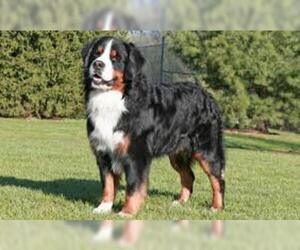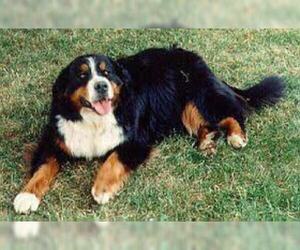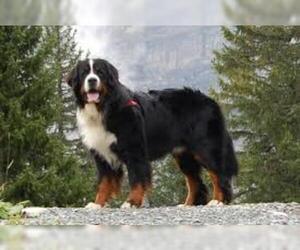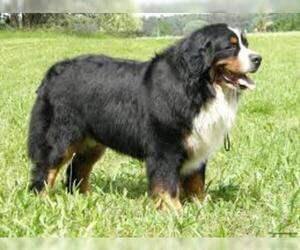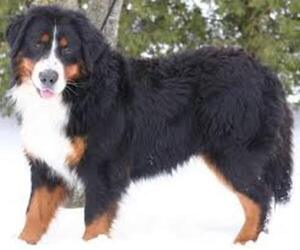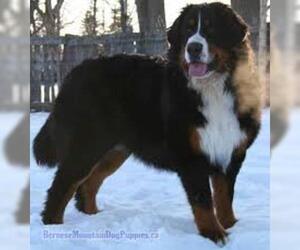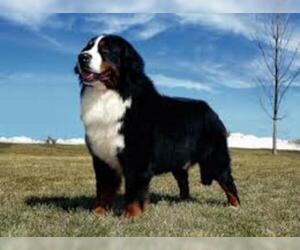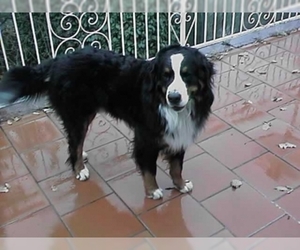
All about Bernese Mountain Dog dog breed
A.K.A. :Berner, Berner Sennenhund, Bernese Sennenhund, Alpine Berner, Swiss Berner, Mountain Berner, Berner Pup, Berner Bear, BMD, Swiss Mountain Dog, Berner Companion, Berner Fluff, Bernese Guardian, Berner Friend, Sennen Dog
Size
Grooming requirements
Exercise requirements
Good with other dogs
Watchdog ability
Energetic
Training requirements
Playful
Affectionate
Good with other pets
Good with children
Good with strangers
Winter
Summer
Healthiness
Protective
Life Span
| Pure Breeds | Member |
| Breeds A - Z | B |
| Breeds by Group | Working |
| Breeds by Trait | Good With Kids |
| Overview: | The Bernese Mountain Dog is a striking and gentle breed originating from the Swiss Alps, where they were traditionally used as farm dogs for herding, guarding, and pulling carts. Physically, they are large, sturdy dogs with a distinctive tricolor coat of black, rust, and white, known for their expressive dark eyes and powerful build. Temperamentally, Berners are renowned for their calm, affectionate, and loyal nature, making them excellent companions. They are generally good with children and other pets, fitting well into active family life, though their size makes them less ideal for small apartment living without ample outdoor access. While their sweet disposition is a major draw, prospective owners should be aware of certain health considerations, including a relatively shorter lifespan and predispositions to conditions like hip and elbow dysplasia and certain cancers. Despite this, their unwavering devotion and majestic presence bring immense joy to their families. |
F.A.Q.
All You Need to Know About the Bernese Mountain Dog Breed
The majestic Bernese Mountain Dog, originating from the Swiss Alps, is renowned for its striking tricolor coat and gentle, affectionate temperament. These intelligent and loyal companions thrive on human interaction, making them excellent family dogs, especially with children. Physically, they are large, sturdy dogs with a distinctive white blaze, rust markings, and a black base coat. While they adore their families, their size makes them generally unsuitable for apartment living, preferring homes with secure yards. Their thick double coat requires regular, but not excessive, brushing to manage shedding and prevent matting. Bernese Mountain Dogs need moderate daily exercise, like walks or playtime, to stay healthy and happy. Prospective owners should be aware of common health concerns such as hip and elbow dysplasia, certain cancers, and bloat, necessitating responsible breeding and veterinary care. A "Berner" will truly enrich your home with its loving presence.The average weight for a Bernese Mountain Dog is 85-110 pounds.
Healthy weight for Bernese Mountain Dog adults typically ranges from:- Males: 80-115 pounds
- Females: 70-95 pounds
Curious about the Bernese Mountain Dog height? You've come to the right place! These majestic giants are known for their impressive stature, and understanding their typical dimensions can help you prepare for a wonderful new companion.
The average size of a Bernese Mountain Dog, measured at the shoulder (or withers), generally falls within a specific range for adult dogs:- Males: Typically stand between 25 to 27.5 inches tall.
- Females: Are slightly smaller, usually measuring between 23 to 26 inches tall.
The Bernese Mountain Dog is famously recognized for its striking tricolored coat. The AKC recognized Bernese Mountain Dog colors include a jet black base, complemented by clear rust (ranging from light to deep) markings on the cheeks, over the eyes, on all four legs, and on the chest, along with distinct white markings. These white markings typically appear as a blaze between the eyes, a symmetrical chest cross or "Swiss cross," and on the tips of the paws. This classic black, rust, and white tricolor is the only color pattern accepted by major kennel clubs like the AKC.While the tricolor is standard, some Bernese Mountain Dogs may exhibit rare coat types or exotic Bernese Mountain Dog variations due to recessive genes or crossbreeding, though these are not accepted by the AKC or breed standards and may indicate a mixed breed. These include ghost tri-color (faded or less vibrant rust markings), bi-color (lacking rust markings, often black and white), or dogs with excessive white. Extremely rare and highly undesirable variations that are not purebred Bernese Mountain Dogs include blue (dilute black), lilac (dilute chocolate), merle (a spotted pattern), or chocolate (brown) coats. These rare Bernese Mountain Dog colors are not typical of the breed and should be approached with caution by potential adopters or buyers, as they can sometimes be associated with health issues or indicate a lack of purebred lineage. Pricing for Bernese Mountain Dogs should primarily reflect the health, temperament, and conformity to the established black, rust, and white tricolor standard.
The Bernese Mountain Dog personality is renowned for being gentle, loyal, and incredibly friendly, making them excellent family companions. Their temperament of Bernese Mountain Dog is generally calm and good-natured, displaying an unwavering devotion to their owners. They are highly sociable and thrive on human interaction, often forming strong bonds with every family member. While intelligent, they are not overly energetic and possess a charming, somewhat reserved dignity, though they are always eager for a good cuddle.Adaptability to apartment living is generally not ideal for this large breed; Bernese Mountain Dogs require space and benefit greatly from a yard and regular outdoor activity. They can adapt to smaller spaces if given ample exercise and mental stimulation, but their size is a significant consideration.With children, Bernese Mountain Dogs are typically patient and tolerant, known for their "nanny dog" qualities. Their gentle nature makes them wonderful companions for kids, though, as with any large breed, supervision is always recommended.Regarding other pets, Bernese Mountain Dogs usually get along well. Their naturally peaceful disposition means they are generally friendly and accepting of other dogs and even cats, especially if socialized from a young age. Early and consistent socialization is key to fostering their already amiable nature.
The Bernese Mountain Dog temperament is renowned for its gentle, affectionate, and loyal nature, making them excellent family companion dog behavior. They are generally very friendly and sociable, greeting strangers with a calm demeanor and thriving on interaction with their human families. Their personality traits include a strong desire to be close to their loved ones, often following them from room to room.Bernese are typically wonderful with children, displaying remarkable patience and a protective instinct without being overly aggressive. They usually get along well with other pets when properly socialized from a young age. While generally calm indoors, their size makes adaptability to apartment living challenging; they truly flourish in homes with more space and a yard.They are known for their intelligence and eagerness to please, though they can exhibit a mild tendency toward stubbornness at times, requiring consistent, positive reinforcement training. Bernese are also quite sensitive to their owner's tone and emotions, responding best to gentle guidance rather than harsh corrections. They thrive on companionship and can develop separation anxiety if left alone for extended periods.
Bernese Mountain Dog Care: Daily Maintenance & Health TipsCaring for a Bernese Mountain Dog involves regular attention to their unique needs. Despite their size, they are a relatively low-energy dog breed, requiring moderate daily exercise like walks to maintain health without overexertion. Avoid strenuous activity, especially in warm weather, as they are prone to overheating.Grooming needs are moderate; their thick double coat requires weekly brushing (more during shedding seasons) to prevent matting and manage loose hair. Occasional baths are sufficient. Their wrinkle and ear cleaning is crucial to prevent infections. Check and clean ears weekly, and ensure any facial folds are kept dry and clean.Dietary considerations involve a high-quality diet appropriate for large breeds, with careful portion control to prevent obesity. Weight management is paramount to reduce strain on their joints, a common concern.Due to their dense coat and slight brachycephalic anatomy, climate sensitivity is high. They thrive in cooler climates and should be protected from heat, always having access to shade and fresh water.Common health concerns include hip/elbow dysplasia, certain cancers, and bloat. Regular veterinary check-ups are essential for early detection and management. Dental care is vital; regular brushing helps prevent plaque buildup and gum disease. Skin issues can arise, so monitor for dryness, hot spots, or allergies.How to care for a Bernese Mountain Dog involves a commitment to consistent grooming, appropriate exercise, a balanced diet, and proactive veterinary care. Understanding these Bernese Mountain Dog care aspects ensures a long, healthy, and happy life for your gentle giant.
Bernese Mountain Dog Activity Level: Understanding Their Energy and Exercise NeedsThe Bernese Mountain Dog activity level is often described as moderate. While they aren't hyperactive, they are not couch potatoes either. These gentle giants typically balance short bursts of playful energy with long periods of rest and relaxation. Understanding their exercise needs is crucial for potential owners.How active are Bernese Mountain Dogs? Berners enjoy daily walks and outdoor playtime. They thrive on being involved in family activities and appreciate opportunities to explore. Their ideal day includes a couple of 20-30 minute walks, along with some supervised playtime in a secure yard. They love to carry things, so a game of fetch (without excessive running) or a "job" to do around the house can be very fulfilling for them.It's important to remember their brachycephalic (short-nosed) anatomy. This makes them susceptible to overheating, especially in warm weather or during strenuous exercise. Therefore, their activity should be adjusted accordingly, with cooler times of day chosen for walks and access to shade and water always available. Intense running, jumping, or prolonged high-impact activities should be avoided to protect their joints and prevent heatstroke.Are Bernese Mountain Dogs suitable for active families or low-energy households? They can fit well into both, with proper management. For active families, they'll enjoy walks and hikes, but owners must be mindful of their limitations. For low-energy households, they will be content with shorter, regular walks and plenty of indoor companionship. Their biggest need is human interaction and being part of the family. They are not a breed that thrives being left alone for long periods or confined without mental and physical stimulation. They excel in activities like canine good citizen classes, therapy work, or even carting, which provides both mental and physical exercise without overexertion.
Breed Breakdown: What Experts Say About the Bernese Mountain Dog
I would rate the "Size" trait of the Bernese Mountain Dog at a 9.This breed is undeniably very large. Males typically stand between 25 and 27.5 inches at the shoulder and can weigh anywhere from 80 to 115 pounds, with females slightly smaller but still substantial. Their body structure is robust and heavily boned, giving them a powerfully built appearance. When compared to the vast majority of other companion dog breeds, from Chihuahuas to Labradors, Bernese Mountain Dogs stand out as one of the largest. This impressive size means they are definitively *not* well-suited for apartment living, frequent travel, or households with significant space constraints. They thrive in homes with ample indoor and outdoor space where they can move freely without feeling cramped.
I would rate the Bernese Mountain Dog's grooming requirements as a 7. While not quite at the "extremely high-maintenance" end, they certainly lean towards the higher side compared to many other companion breeds. Their thick, double coat is a significant factor, leading to year-round shedding with heavier seasonal "blows" that require frequent brushing (several times a week, daily during shedding season) to prevent matting and manage loose hair. Although they don't have excessive skin folds, regular ear cleaning is important to prevent infections due to their floppy ears, and nail trimming needs to be consistent to avoid discomfort. Bathing is generally needed every 4-8 weeks, depending on their activities, to keep their coat clean and healthy. While not inherently prone to extreme skin issues, their thick coat can trap moisture, and allergies, like in many large breeds, can manifest as skin irritation, necessitating careful attention to their coat and skin health. Therefore, while not requiring complex haircuts, their extensive shedding and the need for regular, thorough brushing make them a breed that demands consistent and dedicated grooming effort.
I would rate the exercise requirements of the Bernese Mountain Dog at a 3 out of 10.Bernese Mountain Dogs are generally considered to have moderate to low exercise needs, especially when compared to more active working breeds. While they are large dogs, their energy levels are not particularly high. A daily routine consisting of one or two moderate walks, totaling 30-60 minutes, along with some supervised playtime in a securely fenced yard, is typically sufficient to keep them healthy and content. They are not built for sustained, high-intensity activities like long-distance running or complex agility courses due to their size, heavy bone structure, and a predisposition to joint issues. While not truly brachycephalic, their broader snouts can sometimes lead to less efficient breathing in very hot weather, further limiting their tolerance for strenuous exercise. They thrive with consistent, gentle activity and mental stimulation through training and interaction, rather than requiring rigorous physical demands. Over-exercising a Bernese, especially as a puppy, can be detrimental to their developing joints. They are generally quite happy to relax with their family after their daily constitutional.
I would rate the Bernese Mountain Dog's "Watchdog Ability" as a 6 out of 10.While Bernese Mountain Dogs are generally friendly and good-natured, their large size and deep bark can certainly be an initial deterrent. They are alert to their surroundings and will typically bark to signal the arrival of unfamiliar people or unusual sounds. This initial vocalization serves as a meaningful early warning, letting their owners know something is amiss. Their territorial instincts are present but not aggressive; they are more likely to position themselves between their family and a perceived threat rather than actively confront. However, their willingness to truly deter an intruder beyond an initial bark is limited. They are not typically a breed that will aggressively challenge an unwelcome individual; their protective instincts lean more towards alerting their family and observing rather than actively engaging in a forceful defense. They are more of a gentle giant, capable of providing a significant early warning and making an imposing presence, but ultimately leaning towards being a passive companion rather than a highly vigilant and effective "attack" type watchdog.
I would rate the "Good with Other Dogs" trait of the Bernese Mountain Dog a 9 out of 10.Bernese Mountain Dogs generally exhibit an exceptionally sociable and tolerant nature towards other canines. They are renowned for their gentle and easygoing disposition, which typically extends to interactions with unfamiliar dogs. While proper socialization during puppyhood is crucial for any breed, Berners are inherently less prone to aggression or dominance displays. They tend to adapt well to dogs of various sizes and energy levels, often engaging in playful but gentle interactions even with smaller or more boisterous companions. Their calm demeanor makes them excellent candidates for multi-dog households, where they often thrive in canine company, enjoying the social dynamics. While careful introductions are always advisable for any new animal in a home, Berners usually embrace new furry friends with an open and friendly attitude, requiring minimal specialized training to coexist peacefully.
I would rate the Bernese Mountain Dog's "Energetic" trait as a 4 out of 10.While Bernese Mountain Dogs are not entirely sedentary and certainly enjoy playtime and walks, they are generally considered a low to moderate energy breed compared to many other companion dogs. They are more laid-back than naturally active. Their typical activity level involves moderate daily exercise, such as a couple of good walks, rather than intense, prolonged periods of running or high-impact activity. They are playful, especially as puppies, but this tends to be in bursts rather than sustained, high-octane play. Their endurance is moderate; they can handle a decent hike but are not built for extensive athletic pursuits like marathons or competitive agility at a high level. They do need physical stimulation to stay healthy and happy, but it's more about quality walks and mental enrichment than constant vigorous exercise.A significant factor contributing to this lower energy rating, particularly concerning stamina and exercise tolerance, is their brachycephalic (short-nosed) anatomy. This can make them prone to overheating and respiratory difficulties, especially in warm weather or during strenuous exercise. This anatomical characteristic directly limits their ability to participate in prolonged or high-intensity outdoor or athletic activities, even if their temperament might otherwise incline them to be more active. Their large size and heavy build also contribute to a lower natural endurance compared to lighter, more athletically built breeds. They are more suited to being a loving, calm companion who enjoys a good stroll than a high-energy adventure buddy.
I would rate the training requirements of the Bernese Mountain Dog at a 6 out of 10.While Bernese are intelligent dogs and generally eager to please their human companions, they aren't always the most straightforward to train. Their intelligence can sometimes be accompanied by a streak of independent thinking and a relatively short attention span, especially when they're young. They can be prone to "selective hearing" if something more interesting captures their attention, which requires consistent effort and patience from their owner. Responsiveness to commands is good with positive reinforcement, but they are not a breed that thrives on harsh corrections or heavy-handed methods. They require a gentle, consistent, and reward-based approach. Without consistency, they can become quite stubborn. For these reasons, while not impossible for a beginner, a Bernese Mountain Dog is probably not the ideal first-time dog for someone completely new to dog training. They benefit immensely from an experienced owner or at least a beginner who is committed to enrolling in formal obedience classes and dedicating significant time to structured, daily routines. Early socialization and puppy classes are crucial to harness their potential and prevent problem behaviors from developing.
I'd rate the "Playful" trait of the Bernese Mountain Dog at a 6 out of 10.While Bernese Mountain Dogs certainly enjoy playtime and can be quite goofy and affectionate, they generally aren't known for the boundless, relentless energy of some other companion breeds. They love a good game of fetch or a romp in the yard, and they definitely seek out interaction and attention from their families. Their enthusiasm for toys and playtime is present, often manifesting in a happy "wiggle butt" and a desire to engage. However, they are also prone to more laid-back periods and are not typically hyperactive. They are spirited enough to be fun companions, but also appreciate a good snooze and can transition to a more relaxed state relatively easily. Compared to, say, a Border Collie or a Jack Russell Terrier, they are certainly more mellow, but they are far from inactive and still possess a delightful, playful spirit.
I would rate the Affectionate trait of the Bernese Mountain Dog at a solid 9 out of 10.Bernese Mountain Dogs are renowned for their incredibly loving and devoted nature. They possess an unwavering desire for human companionship, thriving on interaction and closeness with their families. Physical closeness is a hallmark of the breed; they are often described as "velcro dogs" due to their tendency to follow their owners from room to room and seek out opportunities for cuddling, leaning, and even lap-sitting (despite their large size). Their loyalty is profound, forming strong bonds with their family members, and they are remarkably sensitive to owner emotions, often offering comfort during times of sadness or mirroring their owner's joy. They are definitely a breed that thrives on affection and is deeply people-oriented, rather than being independent compared to other companion dogs.
I would rate the "Good with Other Pets" trait of the Bernese Mountain Dog a 9 out of 10.Bernese Mountain Dogs are generally renowned for their gentle, tolerant, and easygoing nature, which extends very well to other animals. They typically exhibit a low prey drive, meaning they are less likely to chase or harm smaller pets like cats or smaller dogs. While they are large dogs, their inherent desire to be part of the family often translates to a desire to include all household members, furry or otherwise. Resource guarding is not a prominent trait in the breed, especially with proper socialization from a young age. While early socialization is beneficial for any dog to develop good manners and confidence, a Bernese Mountain Dog's natural inclination is towards friendliness and peaceful coexistence rather than aggression or dominance. They are highly adaptable to multi-pet households and, with appropriate introductions and a consistent routine, will often form strong, affectionate bonds with other dogs and cats, often becoming quite protective and nurturing towards them. They are naturally sociable and often do not require extensive training or constant supervision beyond basic good manners to coexist peacefully; their temperament naturally leans towards harmony.
The Bernese Mountain Dog rates a solid 9 for "Good with Children." They are exceptionally child-friendly, known for their naturally gentle, affectionate, and patient temperament. They possess a high tolerance for noise and handling, making them well-suited for the sometimes boisterous nature of children. Berners are playful without being overly energetic, enjoying a good romp in the yard but also content to lounge beside their young companions. While they are naturally gentle, supervision is always recommended with any dog and child interaction, and basic obedience training helps to solidify their excellent disposition, ensuring they thrive as a loving and protective family member for children of all ages.
I'd rate the "Good with Strangers" trait of the Bernese Mountain Dog a 7.Bernese Mountain Dogs are generally friendly and gentle, and this extends to their interactions with strangers. They are not typically a breed that will be immediately suspicious or aggressive towards unfamiliar people. Instead, they often adopt a "wait and see" approach, assessing the new individual before offering their characteristic calm and sometimes goofy affection. They tend to be more stoic than boisterous initially, observing before engaging. While they are naturally good-natured and not prone to extreme reservation or unfriendliness, they are also not usually the type to instantly jump on every new person they meet with overwhelming enthusiasm. Their protective instincts are more subtle than overt; they might bark a warning if they perceive a threat to their family or territory, but this is distinct from generalized unfriendliness towards guests. With proper socialization, they adapt very well to public and guest-filled environments, showing a calm and tolerant demeanor. While naturally good-tempered, consistent positive socialization from a young age is still important to ensure they remain comfortable and well-mannered with all types of unfamiliar adults.
I would rate the Bernese Mountain Dog's "Winter" tolerance at a 9.Bernese Mountain Dogs possess an excellent cold-weather resilience, largely due to their thick, double coat, which provides exceptional insulation. Their substantial body size and moderate body fat further contribute to their ability to retain heat. While they are a large breed, which can mean a larger surface area exposed to cold, their dense fur and overall robust build generally outweigh this. A crucial factor to consider, however, is their brachycephalic tendency, which, while not as pronounced as some other breeds, can affect their ability to regulate temperature through panting during strenuous activity, especially when combined with very cold, dry air. Despite this, their primary strength lies in their ability to tolerate very low temperatures. The risk of hypothermia is relatively low in typical cold conditions, and they can safely enjoy prolonged outdoor activity in cold climates, often thriving in snow and ice. Compared to many other companion dogs, Bernese Mountain Dogs require minimal special care during winter months and often revel in the opportunity to be outdoors. The main consideration would be ensuring they don't overexert themselves to the point of overheating in their heavy coat, even in cold weather, and providing access to shelter from wind and extreme precipitation.
The Bernese Mountain Dog rates a 1.5 for "Summer" tolerance. This breed is extremely sensitive to heat due to their thick double coat and their tendency to be somewhat brachycephalic, though not to the extreme of true brachycephalic breeds. While not a flat-faced breed, their skull structure can still impede efficient panting compared to dolichocephalic dogs. They have a very limited ability to regulate their body temperature effectively in warm weather and are at high risk of heatstroke, even with moderate activity. Bernese Mountain Dogs require significant climate control during hot weather, ideally spending the majority of their time in air-conditioned environments. They require special care in summer months, far beyond what most other companion dogs need, including avoiding outdoor activity during the day, providing cooling aids, and constant access to fresh water, making them highly susceptible to heat-related illnesses.
I would rate the Bernese Mountain Dog's "Healthiness" trait as a 4 out of 10.This rating reflects the breed's significant genetic predispositions to a number of serious health issues, which unfortunately contribute to a relatively short average lifespan compared to many other companion breeds. Bernese are particularly prone to various cancers (histiocytic sarcoma, lymphoma, mast cell tumors), which are a leading cause of premature death. They also commonly suffer from orthopedic problems like hip and elbow dysplasia, as well as osteochondritis dissecans (OCD). Other concerns include bloat (gastric dilatation-volvulus), von Willebrand's disease (a bleeding disorder), and progressive retinal atrophy. While responsible breeding practices, including health clearances for parents, can mitigate some risks, the sheer number and severity of prevalent conditions make it challenging to consider them a robust breed. They are certainly high-maintenance in terms of potential veterinary care, requiring vigilant monitoring and often extensive treatments throughout their lives. Compared to many other companion dogs, the Bernese Mountain Dog is generally considered less resilient due to their extensive health challenges.
I would rate the "Protective" trait of the Bernese Mountain Dog as a 6 out of 10.Bernese Mountain Dogs are known for their gentle and affectionate nature, particularly with their families. They are incredibly loyal to their owners, which contributes to a desire to protect them. They possess a good degree of alertness, often noticing and reacting to unusual sounds or the presence of strangers approaching their home. Their territorial instincts are present; they will typically bark to announce an intruder and can appear imposing due to their size.However, while they are excellent watchdogs in the sense that they will alert you to something amiss, their protective instincts generally manifest more as a deterrent through their presence and an initial vocal warning rather than aggressive confrontation. They are not typically a breed that will immediately attack or bite to protect their household. Their friendly disposition, even towards strangers once introduced and deemed non-threatening, means they aren't generally suited as dedicated guard dogs in the same way some other breeds are. They are primarily companion dogs who offer meaningful "protection" through their warning barks and imposing appearance, making an intruder think twice, but they are unlikely to engage in a physical fight to defend a household.
I would rate the "Life Span" trait of the Bernese Mountain Dog at a 3.Bernese Mountain Dogs are, unfortunately, considered a short-lived breed compared to other companion dogs. Their average life expectancy is significantly lower than many other breeds, typically ranging from 7 to 10 years, with many individuals not reaching the upper end of that spectrum. This is largely due to a high prevalence of aggressive cancers (like histiocytic sarcoma, mast cell tumors, and lymphosarcoma) and other serious health issues such as bloat, orthopedic problems (hip and elbow dysplasia), and kidney disease. While responsible breeding and excellent care can certainly contribute to individual dogs living longer, these efforts are often fighting against strong genetic predispositions to debilitating and fatal conditions.
Bernese Mountain Dog Puppies for saleSee all puppies for sale
Bernese Mountain Dog Dogs for adoptionSee all dogs for adoption
Bernese Mountain Dog BreedersSee all breeders
Similar Dog Breeds for Bernese Mountain Dog
Breed Mixes of Bernese Mountain Dog
Quick Breed Selector 0 - not important, 1 - smallest, 10 - largest
Variants & Mistakes :Bernese Mountain Dogs, Bernese Mountaindog, Bernese Mountain Doggs, Bernese Mountian Dog, Bernese Mtn Dog, Bernise Mountain Dog, Bernes Mountain Dog, Burnese Mountain Dog, Bernese Mondain Dog, Bernese Moutain Dog, Bernese Moundain Dog, Bernese Mountan Dog, Bernese Moutn Dog, Bernese Mounatin Dog, Bernese Mounatain Dog, Bernese Mounatin, Bernese Montain Dog, Bernese Mounitan Dog, Bernese Mountain Do, Bernese Mountain Dig, Bernese Mountain DOOG, Bernese MountainDo
